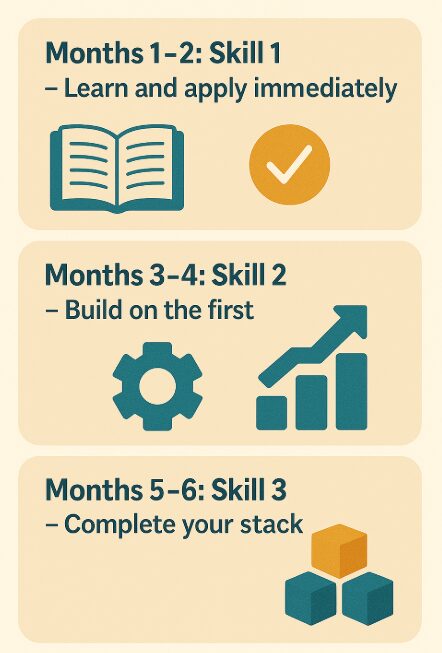If you’ve been in the online business space for more than a week, you’ve probably been told you many things about what you need to succeed and to get your online business skills up to speed. These can include:
- Building a website
- Creating a funnel
- Devising a landing page
- Videoing classes for YouTube
- Mastering email marketing
- Becoming a social media influencer
- Setting up a shop
- Writing the best blog posts
- Mastering the art of engagement
The list is endless, and if you are anything like me, when you start out, you’re just amazed that you have a website with your name on it!
The reality is, we do need many of these skills, but you don’t have to acquire them all at once. And you don’t need to have a PhD in each to be successful.
Sometimes we get all caught up in following this guru or that course leader that we forget to do our homework and attain the right level of skills, in the right order, to keep us moving forward.
This is where the ‘skill’ stack comes into its own, and taking a few minutes to become familiar with it, will save you a lot of time and wasted hours later on.
Skills need to come before systems. There is no point setting up your email systems to the nth degree before you have anyone visit your site!
And that’s where this 6-month plan for mastering online business skills comes in.
What is a skill stack?
A skill stack is a deliberate combination of complementary skills that, when developed together, give you exponential results. It’s the same principle Scott Adams (creator of Dilbert) talks about when he says you don’t have to be world-class at one thing — you can become highly valuable by being good at several things that work well together. See his explanation on YouTube here.
In online business, stacking the right three skills can outperform many ready-made systems, such as funnels, because:
- You’re not dependent on one tool or platform.
- You can adapt to changing trends.
- You understand why something works, not just how to plug it in.
Why three online business skills over six months?
Becoming competent in key 3 skills becomes a sweet spot. It’s enough to make you highly adaptable, but not so many that you’re spread too thin. Most beginners can become completely overwhelmed by what to do when they start and the sheer amount of information and advice out there, and can easily give up. Starting to learn (and practising) 3 key skills over six months allows you to:
- Learn the fundamentals at your own pace
- Practise consistently
- Apply the skills in real projects and see the results
Two months per skill is long enough to build competence without getting stuck in “learning mode” forever.
Choosing your three skills
Your ideal skill stack will depend on:
- The business model you run (or want to run)
- The type of audience you serve
- Your current strengths and knowledge gaps
- Any training you have already undertaken
Here are some high-value skills for online business owners to consider:
- Copywriting – Every ad, email, and sales page relies on words that sell
- Offer creation – Packaging what you sell so it’s irresistible
- Traffic generation – Getting the right people to your offer
- SEO – Building organic visibility that compounds over time
- Content strategy – Planning content that drives leads and sales
- Email marketing – Turning subscribers into loyal customers
- Analytics – Understanding what’s working and why
- Product creation – Digital products, courses, templates, or memberships
- Video creation – Learn to increase your reach and add value
- Social media – Using modern marketing strategies to target your niche market directly

Example skill stacks in action
Case study 1: The micro-course creator
- Skills: Offer creation + copywriting + email marketing
- Why it works: Alex runs a photography business and wanted to sell a £49 “Master Your Smartphone Camera” mini-course. By crafting a clear offer, writing persuasive sales copy, and building a short but powerful email sequence, she sold 200 copies without spending a penny on ads.
Case study 2: The niche blogger
- Skills: SEO + content strategy + affiliate marketing
- Why it works: Mark started a site about home coffee brewing. By researching keywords, publishing optimised guides, and weaving in affiliate recommendations, his site now makes £1,200/month in affiliate income — two years after launch, with most posts still bringing daily traffic.
Case study 3: The service-based entrepreneur
- Skills: Copywriting + social proof building + outbound outreach
- Why it works: Priya is a brand designer who didn’t want to rely on Instagram. She wrote a killer “brand audit” offer, built a portfolio with client testimonials, and used personalised LinkedIn messages to land £10k in projects in four months.
What I did
These are just a few examples of how you could make this strategy work for you. When I started, I needed to learn how to set up a website fast and then how to write engaging posts. Luckily, I already had experience of content writing from a previous job, so that part came easily to me. I had no experience or knowledg,e however, of SEO, programming or design as this had always been done by other people. I knew even less about affiliate marketing and social media. So I took my time and worked on:
- Creating and designing my website
- Learning SEO
- Getting a presence on social media
Over time, I have picked up many more skills such as:
- Graphic design
- Youtube
- Marketing funnels
- Email lists
- Virtual reality
- AI
And I’m still learning. That’s what makes it fun!
So here is a 6-month plan which you can adapt depending on your own needs.
The 6-month deep dive plan
Here’s how you might approach it:
Months 1–2: Skill 1 – Learn and apply immediately
- Pick your first skill based on the biggest gap in your current results or the most urgent need to get you started
- Use a mix of online courses, books, and free resources such as YouTube, websites like this, courses and podcasts
- Apply daily or weekly in your business to practise your new skill
Months 3–4: Skill 2 – Build on the first
- Choose a skill that complements the first
- Start integrating them together — e.g., using copywriting to improve your SEO titles and meta descriptions
Months 5–6: Skill 3 – Complete your stack
- This should round out your ability to take someone from stranger to customer.
- Combine all three in a single project — e.g., create an offer, write the copy, and drive traffic.
Remember, progress beats perfection any day, so keep working on things and forget about making everything perfect before you publish. You can read more about this in my article on why I go for progress over perfection.

My top tips
Here are a few of my top tips when it comes to skill stacking:
- Be disciplined in your business – set aside time and stick to it
- Don’t get distracted by ‘shiny object syndrome’ – there will always be something new to drag your attention away from what you are currently working on, but stay focused – there will be time in the future to pick up something new
- Be kind to yourself if it doesn’t all go to your initial master plan. Allow yourself space and time and just keep going
- Never give up!
Why this beats ‘tool-chasing’
Tools change. Online business skills don’t.
If Facebook ads triple in cost, you can pivot to SEO because you know how to drive traffic without paying for every click. If your email platform shuts down, you can rebuild your sequence anywhere because you wrote it yourself.
It’s the difference between owning the recipe and relying on pre-packaged microwave meals.
And as someone who is only just learning to cook, I can tell you, it’s worth it!
Your action plan today
- Audit your current skills. Where are the gaps that hold you back most?
- Pick your 3 skills. Make sure they connect logically
- Set your 6-month schedule. Block out learning and application time
- Find your resources. Invest in quality courses or mentors
- Track your progress. Review at the end of each 2-month block
Systems work, but without the skills behind them, they’re just digital window dressing. If you want a business that lasts through every algorithm change, trend, and tool update, invest in these online business skills. Six months from now, you could be running a business that’s lean, adaptable, and 100% under your control.
And in business, 6 months is nothing!
Internal link suggestions for MOI:
- Link “offer creation” to your One Page, One Offer article.
- Link “SEO” to any existing SEO-related article on MOI.
External link suggestion:
- Link “Scott Adams” to his blog post on skill stacking for credibility.
Related posts
One-page, one-offer landing pages
How to build a beginner marketing funnel
SEO blog optimisation: A to-do list for traffic growth

This concept of a six-month skill stack is really inspiring—especially the idea of building layered skills in online business instead of going all-in on just one. The breakdown of message, medium, and results-oriented skills feels spot-on: you need to know how to communicate your value, how to deliver it, and how to make it effective. Pairing messaging with execution—email marketing, content creation, or even design—makes that value scalable and actionable.
You’re not just learning skills—you’re learning how to learn and apply them. That shift toward rapid execution and building while you learn is a game-changer. It turns every project into an opportunity to sharpen what matters most. Love how this isn’t just about short-term gain, but about becoming a deliberate problem-solver.
Great article!
Hi again Leahrae. Nice to see you again and thanks for your kind comments here. I’m glad you found it useful too. I agree that in business, we need to think of the long-term gains we are getting and the life skills we are developing more than just short-term wins. They are great if you get them, but we really want to build sustainable businesses that will enable us to scale our businesses in the future, and building skills is the way to go here I feel. Thanks for taking the time to read the article and have a great day. Gail
Hey a great post you have here especially for beginners!
Many start out wondering how would they acquire these skills and can they succeed with little knowledge but like you have stated it is possible but takes patience and dedication.
The list of skills you have mentioned are certainly ones you need to help grow your business, I too am still working on building mines so this is something you continue learning as you develop.
Thanks again and have a great day!
Hi Sariyaj. Thanks for your kind comments on the article here and I’m glad you found it useful. You’re right to think about which skills you need to develop over time, but you don’t need to aquire them all at once – that just leads to burnt out. I am still learning a lot every day because the change are happening so fast. Just keep going, one step at a time and you will eventually reach your goals… and then you’ll create some new ones and start on those, but that’s the beauty of it. All the best to you too. Gail